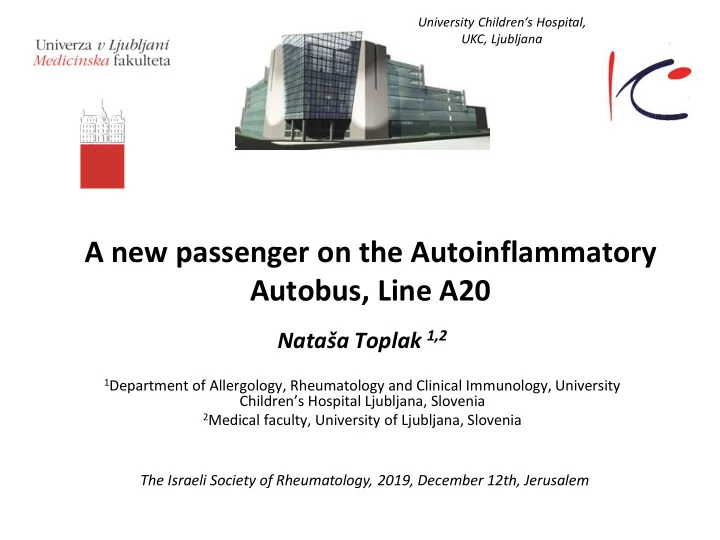

University Children ‘ s Hospital, UKC, Ljubljana A new passenger on the Autoinflammatory Autobus, Line A20 Nataša Toplak 1,2 1 Department of Allergology, Rheumatology and Clinical Immunology, University Children ’ s Hospital Ljubljana, Slovenia 2 Medical faculty, University of Ljubljana, Slovenia The Israeli Society of Rheumatology, 2019, December 12th, Jerusalem
Outline of presentation • A new disease Haplo-insufficiency A20 • Genetics • Mechanism- the disturbance of ubiquitination • Other diseases with similar mechanism • Clinical presentation • Treatment
A20 Haploinsufficiency • Haploinsufficiency A20- a newly described AD autoinflammatory disease • First described in 2016 Zhou et al. Nat gene 2016 ; Aeshlimann et al. Ann Rheum dis 2018. • Patients may present with: - dominantly inherited, early-onset systemic inflammation and a Behcet-like disease, or a variety of - autoinflammatory and autoimmune features Aeshlimann et al. Ann Rheum dis 2018, Aeschlimann&Laxer. Curr Opin Rheumatol 2018.
Genetics • Chromosome 6 / Gene TNFAIP3 / protein A20, also called TNFα Induced Protein 3 (TNF/AIP3) / 790 amino acids • Gene / 9 exons • Currently 39 variants (infever data base) https://infevers.umai-montpellier.fr/web/ TNFAIP3 (NM_006290.3) sequence variants (A20, AISBL, OTUD7C, TNFA1P2)/ Editor(s): Ivona AKSENTIJEVICH
Mechanism • Protein A20 / TNFα Induced Protein 3 (TNF/AIP3) is NF- κ B regulatory protein • loss-of-function mutations in TNFAIP3 result in the activation of the nuclear factor (NF)- κ B pathway Dysregulation of ubiquitin pathway- - decreased deubiquitination of NF- κ B inhibitor (mutated A20) - increased degradation of NF- κ B inhibitor Aeshlimann et al. Ann Rheum dis 2018, Aeschlimann&Laxer. Curr Opin Rheumatol 2018.
Mechanism / Ubiquitin • Ubikvitin - small regulatory protein, which is added to substrat protein- proces of ubiquitination / post-translational modification • Ubiqutination affects proteins in several proceses - Label the protein for degradation in proteasom - Repair of DNA - Activation of protein kinases / regulatory role • Highly dynamic pocess- reversable by deubiqutination Nassif et al. IUBMB life 2016. Aeschlimann&Laxer. Curr Opin Rheumatol 2018.
Increased degradation of kB inhibitor (IkB) Activation of a NF-kB pathway Aeschlimann&Laxer. Curr Opin Rheumatol 2018.
Other diseases / dysregulated ubiquitination Disease Clinical presentation haploinsufficiency of A20 a disease phenotype mimicking BD or other more common, multifactorial diseases, particularly those presenting with (HA20) mucosal inflammation, an early disease onset and a positive 61 cases / 26 families FH; AD dis. signs and symptoms usually begin within the first few weeks of OTULIN deficiencies life: recurring episodes of fever; diarrhoea; painful, swollen (otulipenia) joints; and skin rashes. The skin rashes- due to inflammation 4 cases of the fatty tissue- panniculitis- causes painful red bumps. Lipodystrophy / Failure to thrive. AR dis. linear ubiquitin chain chronic autoinflammation, invasive bacterial infections and muscular amylopectinosis- a muscular deficiency that can assembly complex affect the cardiac muscles in particular. AR dis. (LUBAC) 3 cases Aksentijevich & Zhou. Front Immunol 2017 Yu et al. World Journal of Pediatrics 2019
Clinical presentation • First described in 2016 • Clinical picture form first 16 patients (13 F) from 7 unrelated families recently published- 2018 • Manifested in early childhood (range- first week of life- 29 y of age) • The main clinical symptoms: - Recurrent oral, genital and/or GIT ulcers 16/16 - Musculoskeletal complaints 9/16 - GIT complaints 9/16 - Cutaneous lesions 8/16 - Episodic fever 7/16 - Recurrent infections 7/16 - ANA pos in 4/10, anti-DNA pos 2/5 - Biopsy- nonspecific chronic inflammation Zhou et al. Nat gene 2016 ; Aeshliman et al. Ann Rheum dis 2018.
Clinical presentation • Review of published cases – 2019 • first described patients Caucasian, 29 Japanese patients reported later • 61 patients from 26 families, 62% female • Highly variabile clinical manifestations- patients had been diagnosed with Behcet ’ s dis, RA, RF, JIA, PFAPA, Crohns disease, SLE and even adult-onset Stills ’ disease • Initial symptoms occurred early, at a mean age of 14 years (5 d to 29 y), 73% of patients ( n = 45) experienced their first symptoms before 10 years of age • 64% of patients reported oral and/or genital ulcers • only 5 patients with ocular manifestations (typical for Behcet!) • 44% recurrent fever • 44% GIT complaint • 43% skin changes • 33% musculosceletal complaints Yu et al. World Journal of Pediatrics 2019
Treatment • Nearly half of the patients responded to cholchicine • GCS, mesalazine, cyclosporine, Mtx, azatioprine • Anakinra, rituximab, tocilizumab, infliximab Yu et al. World Journal of Pediatrics 2019 Zhou et al. Nat gene 2016; Aeshlimann et al. Ann Rheum dis 2018.
Conclusion • Fever is the most common sign of the most common diseases • Recurrent/ periodic fever could be a sign of a rare disease • Concept of autoinflammation is changing / new mechanisms … • AI are rare, even more rare are diseases of disturbed ubiquitination • Spectrum of clinical presentation • Importance of genetic diagnosis when you run out of ideas for diagnosis- think about AUTOINFLAMMATION New bus line A 20
Recommend
More recommend